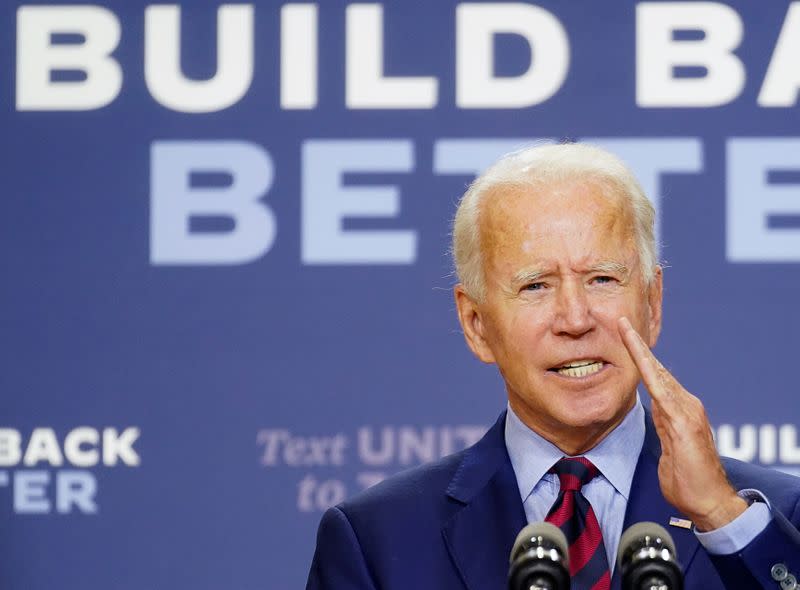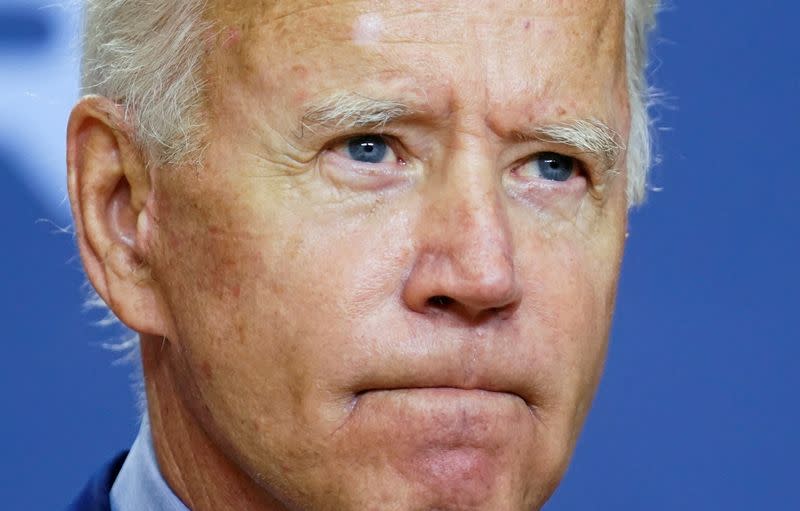Pulled in many directions, Biden may keep Trump's China tariffs in place
By David Lawder and Trevor Hunnicutt
WASHINGTON/WILMINGTON, Del. (Reuters) - “Damaging,” “reckless” and “disastrous” are some of the words Joe Biden has used to describe tariffs imposed by Donald Trump on allies and rivals alike.He may keep some in place anyway if he is elected president of the United States in November.
Republicans largely abandoned traditional party goals such as unfettered trade and balanced budgets to embrace Trump's "America First" agenda. For Democratic-party challenger Biden, with a history of supporting free trade but also attuned to voices calling out for a different approach, the task is not so simple.
Biden is backed by labor unions who want job protections and infrastructure spending, and progressives who want action on climate change, lower drug prices and human rights, while facing demands from farmers and U.S. corporations eager for tariff cuts and a less disruptive China trade relationship.
The mix of conflicting interests adds up to a wait-and-see approach that could keep many of the tariffs Biden would inherit from Trump in place for years, say former and current advisers, lobbyists and trade analysts.
"It's unclear how he will balance these different competing forces," said Mary Lovely, a Syracuse University economics professor and senior fellow at the Peterson Institute for International Economics.
The series of staggered tariffs the Trump administration imposed on $370 billion (283.48 billion pounds) worth of Chinese goods in 2018 and 2019 have cost U.S. importers some $61.6 billion to date, according to U.S. Customs and Border Protection data https://www.cbp.gov/newsroom/stats/trade, and have been blamed for eroding U.S. manufacturing competitiveness.
Duties on steel, aluminum, washing machines, solar panels and European Union goods added another $12.2 billion in punitive collections through Sept. 2.
The U.S. trade deficit with China narrowed (https://www.reuters.com/article/us-usa-economy/u-s-trade-deficit-shrinks-in-2019-for-first-time-in-six-years-idUSKBN1ZZ1WP) in 2019, but Census Bureau data on Thursday showed the nation's trade gap in July jumped to $63.6 billion, its widest in 12 years, with China accounting for nearly half of it.
Trade experts say Biden's hands may be tied.
"I don't see any scenario in which he can go in, in the first 6-12 months, and lift those tariffs," said Nathan Sheets, a former Obama administration Treasury undersecretary who negotiated with China on economic issues.
"The current political environment - left, right and center - is going to require Biden to be tough on China," said Sheets, now chief economist with PGIM Fixed Income.
FROM FREE TRADE TO FAIR TRADE
Biden has backed free trade over his three decades in Congress, during a period when increasing globalization was viewed as a path to prosperity. He supported the 1994 North American Free Trade Agreement (NAFTA) and China's entry into the World Trade Organization in 2001.
As vice president, he was a vocal proponent of the Trans-Pacific Partnership, the Obama administration's attempt to counter China's growing influence in Asia.
That support for free trade has given ammunition for Trump to attack Biden as being "soft on China" and allowing U.S. jobs to migrate to low-wage countries.
Biden has struck back, saying he is not afraid to use trade barriers - but only when they make sense.
"I will use tariffs when they are needed, but the difference between me and Trump is that I will have a strategy - a plan - to use those tariffs to win, not just to fake toughness," Biden wrote in a statement to the United Steelworkers union in May. Steel and aluminum tariffs would stay until a global solution to limit excess production - largely centered in China - can be negotiated, it said.
Biden's "Made in All of America" economic plan (https://joebiden.com/made-in-america/#) suggests the use of carbon-based tariffs to punish countries failing to meet climate goals, a move that could please progressives eager for the United States to take a stand on global warming.
The plan also vows reform of the World Trade Organization, and "aggressive trade enforcement actions" against unfair practices by China and other countries, including currency manipulation, dumping of below-cost exports, and "state-owned company abuses, or unfair subsidies."
The Trump administration aimed to address Chinese dumping and state subsidies, but the Phase 1 trade deal does not.
MAKING PEACE WITH ALLIES ON TRADE
One way Biden would depart from Trump is by consulting with allies about the best way to deal with China, said Jeff Prescott, a Biden campaign policy adviser.
Working with Europe, Japan and other allies "can bring a significant percentage of the global economy to bear" on China to curb non-market practices and to reform WTO rules, he said.
Trump still has support from many blue-collar workers in the swing states of Michigan, Ohio, Pennsylvania and Wisconsin, but Biden is backed by the country's biggest union group.
AFL-CIO President Richard Trumka said on Thursday he believes Biden would impose rules to "keep workers safe" in the pandemic, use tax incentives to encourage the reshoring of critical supply chains and deliver a major infrastructure spending drive, with strong "Buy American" requirements.
Trump, he said, "hasn't lived up to his hype."
Jon Lieber, U.S. managing director for the Eurasia Group political risk consultancy, said that while what Biden is proposing is a different brand of economic nationalism than Trump, "lower barriers for China would be totally inconsistent with that goal."
Whatever the decisions on trade, Biden advisers say there is no going back to the pre-Trump trade consensus, where businesses successfully pushed U.S. governments to continually shrink trade barriers, while touting globalization.
"There's a kind of recognition that ultimately the goal of international economic policy is not to make the world safe for multinational corporations to do business," said Prescott. "It's fundamentally about jobs in the United States, about the middle class at home and building our economy here."
(Reporting by David Lawder in Washington and Trevor Hunnicutt in Wilmington, Delaware; Editing by Heather Timmons and Andrea Ricci)

 Yahoo Finance
Yahoo Finance 

